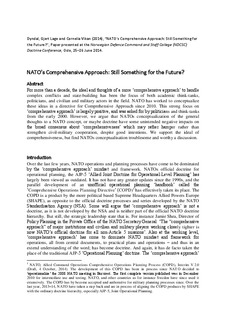| dc.description.abstract | For more than a decade, the ideal and thoughts of a more ‘comprehensive approach’ to handle complex conflicts and state-building has been the focus of both academic think-tanks, politicians, and civilian and military actors in the field. NATO has worked to conceptualize these ideas in a directive for Comprehensive Approach since 2010. This strong focus on ‘comprehensive approach’ is largely positive, and was asked for by politicians and think-tanks from the early 2000. However, we argue that NATOs conceptualization of the general thoughts to a NATO concept, or maybe doctrine have some unintended negative impacts on the broad consensus about ‘comprehensiveness’ which may rather hamper rather than strengthen civil-military cooperation, despite good intentions. We support the ideal of comprehensiveness, but find NATOs conceptualisation troublesome and worthy a discussion | nb_NO |
